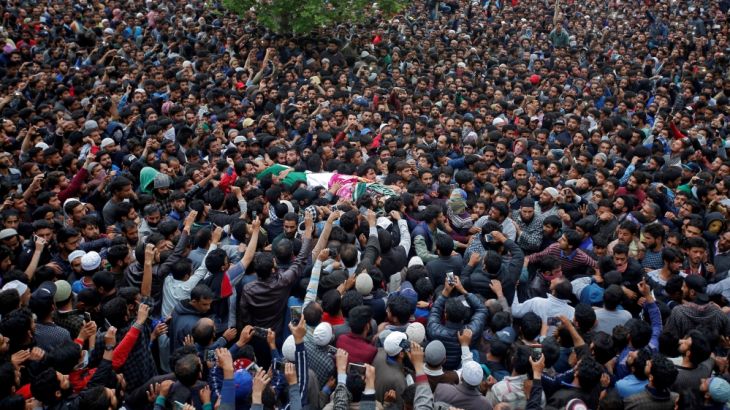UN calls for international probe into Kashmir rights violations
UN Human Rights Office report accuses India and Pakistan of ‘excessive use of force’ and human rights abuses in Kashmir.

The UN human rights chief on Thursday called for an international investigation into abuses in Kashmir, as his office released its first-ever report on alleged rights violations committed by both India and Pakistan in the disputed territory.
Zeid Ra’ad Al Hussein said he would urge the Human Rights Council, which opens a new session next week, “to consider establishing a Commission of Inquiry (COI) to conduct a comprehensive independent international investigation into allegations of human rights violations in Kashmir”.
Keep reading
list of 4 items‘Blatant aggression’: Reactions to US veto of Palestine’s UN membership bid
US blocks Palestinian push for full UN membership at Security Council
Why is Germany maintaining economic ties with China?
“Alleged sites of mass graves in the Kashmir Valley and Jammu region should be investigated,” he said in a statement.
A COI is one of the UN’s highest-level probes, generally reserved for major crises like the conflict in Syria.
According to the 49-page report, Indian security forces have used excessive force in Kashmir and killed and wounded numerous civilians since 2016.
India rejects ‘motivated’ report
India, on its part, rejected the claims made in the report.
“India rejects the report. It is fallacious, tendentious and motivated. We question the intent in bringing out such a report,” the foreign affairs ministry said in a statement released on Thursday.
“It is a selective compilation of largely unverified information. It is overtly prejudiced and seeks to build a false narrative.
“The report violates India’s sovereignty and territorial integrity. The entire state of Jammu and Kashmir is an integral part of India. Pakistan is in illegal and forcible occupation of a part of the Indian state through aggression.”
First-ever @UNHumanRights report on #Kashmir calls for international inquiry into #humanrights violations and abuses on both sides of the Line of Control: https://t.co/8SeQ9tlhZU pic.twitter.com/P7OSNj6HJl
— UN Human Rights (@UNHumanRights) June 14, 2018
Turning to territory under Pakistan’s control, the report identifies “a range of human rights abuses,” but notes they “are of a different calibre or magnitude and of a more structural nature”.
The rights office also said that restrictions on freedom of expression and assembly made it difficult to obtain information about conditions in Pakistan-administered Kashmir.
Pakistan should “end the misuse of anti-terror legislation to persecute those engaging in peaceful political and civil activities and those who express dissent,” the UN said.
Pakistan’s foreign office welcomed the report, saying it was consistent with Islamabad’s demands for an investigation into “gross and systemic violations, including pellet guns excessive use of force, arbitrary arrest and detentions…”.
“The contents, scale and the narrative of killings, maiming, abuse and impunity articulated in the report is a reaffirmation of what Pakistan has long highlighted for the international community.
“References to human rights concerns in Azad Jammu and Kashmir (AJK) and Gilgit-Baltistan [part of Pakistan-administered Kashmir] should in no way be construed to create a false sense of equivalence with the gross and systematic human rights violations in IoK [Indian occupied Kashmir],” it said.
Activists welcome report
Speaking to Al Jazeera, Kashmir-based human rights activist Khurram Parvez said that the UN report on Kashmir was “historical and symbolically a huge step leading to a significant acknowledgement of the Indian government’s role in massive human rights abuses”.
Parvez, who works with civil society organisations in Indian-administered Kashmir, said the UN report had “authenticated our allegations that impunity for armed forces is chronic in Jammu and Kashmir”.
Immad Nazir, who works with Association of Parents of Disappeared Persons (APDP) in the disputed territory, agreed.
“The International community should also take note of… the violence perpetrated on the civilian population who demand their political rights as recognised by the UN.”
Ilyas Zargar, a 29-year-old resident of Srinagar, also welcomed the report and called on the UN to “hold India accountable for the daily human rights violations in Kashmir” through a real inquiry into abuses.
Months-long violence
The findings come amid a precarious security situation in Kashmir, where Indian forces have been running a military offensive against rebels in recent years.
The report said that Al Hussein met representatives of both governments following an upsurge of violence in July 2016, triggered by India’s killing of Burhan Wani, a 22-year-rebel commander.
Concerned by what the UN termed “large and unprecedented” protests after Wani’s death, Zeid asked for “unconditional access” to Kashmir, but neither government agreed.
His office then began remote monitoring of the region, ultimately producing a report covering alleged abuses between January 2016 and April of this year.
Activists estimate that up to 145 civilians were killed by security forces and up to 20 civilians were killed by armed groups in the same period, the report said.
The report also criticised the use of pellet shotguns by security forces to quell the protests, which caused eye injuries in more than 6,000 people.
It called for the repeal of Armed Forces Special Powers Act 1990 (AFSPA), a law that gives security forces immunity from prosecution.
“Impunity for human rights violations and lack of access to justice are key human rights challenges in the state of Jammu and Kashmir,” the report said.
Mountainous Kashmir, which is mostly Muslim, is divided between the nuclear-armed neighbours, who both claim it in full and have fought two of their three wars over the region since their separation in 1947.
New Delhi has long accused Islamabad of training and arming fighters and helping them infiltrate the heavily militarised Line of Control (LoC) that separates the two sides in the region, a charge Islamabad denies.
India has about 500,000 soldiers in the part of Kashmir it controls, where armed groups are fighting for independence or a merger with Pakistan.
Additional reporting by Rifat Fareed from Srinagar